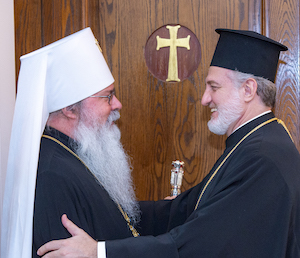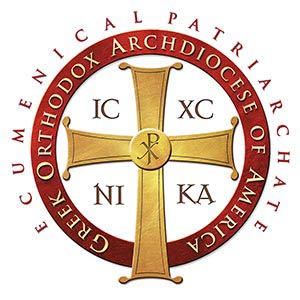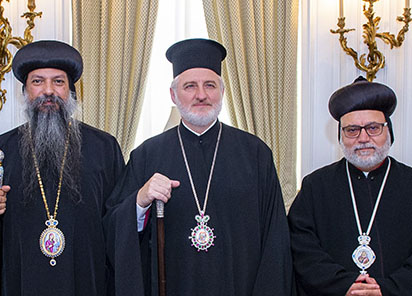OUR OOOPA GREEK FOOD FESTIVAL AT ST. JOHN'S IS MOVING THE DATE OF THE FESTIVAL. PLEASE CHECK FOR NEW DATE ONLINE AND AT CHURCH IN THE NEAR FUTURE.
WE ARE EXTENDING THE DEADLINE FOR JOURNAL ENTRIES SINCE WE ARE STILL RECEIVING THEM. THANK YOU FOR YOUR INTEREST AND BLESSINGS!
WE ARE STILL IN NEED OF DONATIONS FOR THE RENOVATIONS. SO PLEASE TAKE THE TIME AND BE AS GENEROUS AS YOU CAN TO HELP KEEP ST. JOHN'S A VIABLE COMMUNITY FOR TODAY AND THE FUTURE.
THE GREEK DANCE CLASS ON WEDNESDAY HAS CONCLUDED FOR THE SUMMER AND WILL RESUME ON SEPTEMBER 4, 2019.
BIBLE STUDY ON THURSDAY WILL BE IN SESSION DURING MOST OF THE SUMMER. PLEASE CALL THE CHURCH OR ASK ANYONE AT THE CANDLE STAND FOR INFORMATION.
IF YOU HAVE NOT SENT IN THIS YEAR'S STEWARDSHIP PLEASE DO THAT TODAY.
THANK YOU FOR YOUR GENEROSITY!
_____________________________
THE LORD'S PRAYER!
Recently there has been some debate by Pope Francis of the Roman Catholic Church over the prayer that Jesus Himself taught us to pray. Does the debate have merit, should the Catholic Church change what the Orthodox Church considers to be a correct and valid translation from Greek? In the publication called the "Economist," it deals with this very issue dated June 2019 entitled "A new rendering of Christianity's best-know supplication: Why Pope Francis likes the French view of temptation." Below is the entire article. You be the judge whether the prayer meets with Christ's criteria or not.
"IN THE world of conservative Catholics, bent on proving that the current pontiff is a theologically dubious innovator, it feels as though Pope Francis has just given them fresh ammunition. According to newspaper reports in many countries, the Argentine pontiff has just changed the Lord’s Prayer, the supplication beginning with the words 'Our Father' which was taught by Jesus Christ and is used by just about all his followers.
To some traditionalists, such recklessness is tantamount to changing the Declaration of Independence, in other words fiddling about with a set of words which, once delivered, was meant to stand for all time. Imagine how foolhardy this sort of tampering would look to Muslims, who believe that God’s message was revealed at a particular time, in a particular form of Arabic words, of which not one iota can be changed. For a devout Muslim, renderings of the Koran into other languages are an approximation at best; the Arabic original is the only definitive one. For a devout Jew, only the Hebrew original of the Torah has any real standing as the word of God, though slightly different versions of that text exist. Still, the fact that Christianity now accepts the idea of a spiritually inspired translation, on a par with the original, makes things more complicated.
So what has really happened with that Christian prayer? In 2017 Pope Francis told an Italian TV channel that he was unhappy with the standard translations of one particular line in the prayer which Christ proposed. That line is “lead us not into temptation” or in Italian “non indurci in tentazione”.
He explained: 'It is not a good translation because it speaks of a God who induces temptation… I am the one who falls. It is not Him pushing me into temptation to then see how far I have fallen. A father doesn’t do that, a father helps you to get up immediately. It is Satan who leads us into temptation, that’s his department.'
In the wake of that papal bomb-shell, it was left up to national bishops’ conferences, responsible for translation into their respective languages, to decide how to respond. In fact, well before Francis spoke, French bishops had decreed a change similar to one he recommended. 'Ne nous laisse pas entrer en tentation' (do not let us enter into temptation) replaced 'Ne nous soumets pas à la tentation', which could mean something like 'Do not subject us to temptation.' Indeed Francis gave the French bishops credit for having blazed a new linguistic trail, and they may well have given him the idea of proposing similar changes in other tongues.
The Catholic prelates of Germany, and of England and Wales, considered the matter and decided to let their existing (“lead us not into...”) versions stand. The latest development, prompting the recent headlines, is that Italy’s bishops, in consultation with the Holy See, have given final approval to an Italian version which reflects the pontiff’s thinking and will be used in a forthcoming Missal or prayer-book. The new rendering is 'non abbandonarci alla tentazione…' meaning something like 'do not abandon us to temptation...'
So who is right? Your correspondent will not claim to sit in theological judgement over the pope but the question does have a purely linguistic dimension.
There is no doubt that 'lead us not into temptation' is a pretty accurate rendering of the early Greek texts from which later Bibles have been translated. 'Do not bring us into temptation' might be even closer. In fact, the word whose rendering needs careful thought is not the verb but the noun, peirasmos, the term which is usually translated as “temptation”.
In both ancient and modern Greek, it has a range of senses, covering many different things, trivial and grave, that might try, test or vex us or somehow throw us off course. In the context it is reasonable to assume that trials of a more serious kind are being referred to. So a loose but broadly fair translation of the contested phrase might be something like 'do not test us more than we can bear…'
That is what some people high up in the American Catholic hierarchy seem to think, anyway. Consult the text of the Bible as published on the website of the United States Conference of Catholic Bishops and you will find the following rather memorable, but perhaps alarming, version of the relevant verse (Matthew 6:13), taken from the New American Bible (Revised Edition) of 2011.
'Do not subject us to the final test, but deliver us from the evil one…' The American rendering is a bold one but it does avert one of the potential problems posed by the new papally blessed Italian formula. To an impious soul, being 'abandoned to temptation' might sound enjoyable, indeed almost… irresistible." End of Quote AMEN
 NEW YORK – Archbishop Elpidophoros received today Metropolitan Tikhon of the Orthodox Church in America (OCA) for their first official visit. The two hierarchs discussed the developing relationship between the Archdiocese and the OCA in recent years, committing to deepening cooperation.
NEW YORK – Archbishop Elpidophoros received today Metropolitan Tikhon of the Orthodox Church in America (OCA) for their first official visit. The two hierarchs discussed the developing relationship between the Archdiocese and the OCA in recent years, committing to deepening cooperation.
 NEW YORK – On Wednesday, August 14, 2019, His Eminence Archbishop Elpidophoros met with a delegation from the National Council of Churches of Christ (NCC), including The Rt. Rev. W. Darin Moore (Chair), Jim Winkler (General Secretary and President), and Dr. Tony Kireopoulos (Associate Secretary General).
NEW YORK – On Wednesday, August 14, 2019, His Eminence Archbishop Elpidophoros met with a delegation from the National Council of Churches of Christ (NCC), including The Rt. Rev. W. Darin Moore (Chair), Jim Winkler (General Secretary and President), and Dr. Tony Kireopoulos (Associate Secretary General).
 NEW YORK – His Eminence Archbishop Elpidophoros met today, Monday, August 12, 2019, with a delegation from the Standing Conference of Oriental Orthodox Churches
NEW YORK – His Eminence Archbishop Elpidophoros met today, Monday, August 12, 2019, with a delegation from the Standing Conference of Oriental Orthodox Churches

